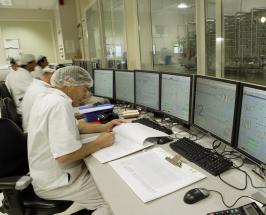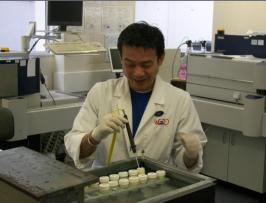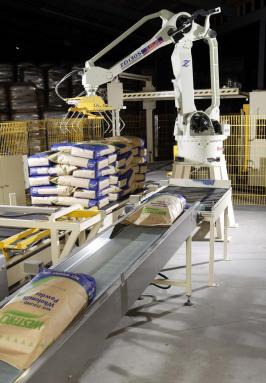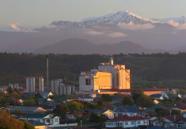Industry knowledge leads teacher to reassess teaching programmes
Industry knowledge leads teacher to reassess teaching programmes describes a teaching strategy that was used to enhance Year 9–13 student understandings in the Nature of Technology and Technological Knowledge strands in Food Technology. Read more about the Teacher Fellowship scheme.
After a six-month placement at Westland Milk Products (WMP) as part of her Endeavour Teacher Fellowship, Gillian Mandley returned to her classroom with new skills, and industry links. She immediately began to make changes to her junior and senior programmes to incorporate some of what she had learnt.
Gillian says she has always been interested in the links between food and science and enjoys the "investigating and finding out" aspects of her work. She gained a Bachelor of Science in the UK where she taught in the Food and Science learning areas before coming to New Zealand in 2002.
Teacher Fellowship – exploring the milk production process
Gillian applied for and was awarded a two-term Endeavour Teacher Fellowship, during which she was hosted by WMP in Hokitika. Her association with the company had begun when Food Scientist Tracey Fearey had mentored one of her Challenge groups, that she had entered in the NZIFST/CREST Student Product Development Challenge. During Gillian’s fellowship she was supported by Tracey, Compliance Manager Paula Hewer and Head of Research and Development Michael Teen.

WMP –use of computerisation to control the process.
Her time at WMP gave Gillian an insight into how milk is processed, quality assurance procedures and legislation, and customer requirements. She was able to follow the of taking raw milk through to a final processed product.
Activities such as visiting a dairy farm with the company’s farm liaison officer and accompanying a milk tanker driver on a collection run gave her a better understanding of the issues associated with the collection, storage, and grading of milk. Gillian spent time in all areas of the milk factory – from the jumbo wash (where the milk tankers are cleaned) to the unloading bay, the raw milk silos, the separator room, the powder plant, the protein plant, the butter plant, and the powdered milk store – observing, talking to operators and supervisors about their work.
Gillian gained hands-on experience, helping to conduct bulk-density testing and GMP (Good ) checks with the quality assurance leader. She also spent time in the various testing laboratories – raw milk, micro-lab, chemistry, sampling, reference and sensory evaluation – where she tested samples for bulk density, colour, water activity, and particle size.
After following the from farm to loading dock, Gillian studied WMP’s documentation – manuals and the Hazards Analysis and Critical Control Points plan – as well as legislation on international food standards and New Zealand food safety and dairy product criteria.
Codex Alimentarius – International food standards
She also looked at customer documents and completed customer questionnaires. This showed her that while compliance with legal requirements is mandatory, customers often have other demands.
Spending time in all areas of the plant gave Gillian a good understanding of the processes and the involved in milk production and the connections between different aspects of .
“Working in the processing plant enabled me to acquire an overview of the business and achieve an understanding of primary processing and , as well as all the food safety and quality procedures involved in producing dairy products for export,” Gillian says. She adds that her time with the Quality Assurance department gave her a greater understanding of how regulations underpin procedures, product development, and product quality and consistency.

During her fellowship Gillian attended an NZFIST course (‘Create food labels from scratch’) in which she learnt about food labelling and the legislation that guides it – information she will share with her students when they have to produce a label for a new product they’ve developed.
Gillian also attended the NZISFT annual conference, which she says “was really useful for putting things together. It was a wonderful experience and added to all the learning I had done over the last six years.” This to talk to people in industry was valuable , not only to extend her of industry – the food companies, what they do and their range of products – but to create relationships. One manufacturer gave her ingredients, another offered to lend equipment, and several people invited her to telephone them if she needed anything.
An opportunity for professional reading and research
Another benefit of the teacher fellowship was the it gave for extra professional reading and research. In previous years Gillian had focused on the strand; now she planned to teach the Nature of and strands in more depth. The fellowship gave her time to look at these strands in relation to industry , and to reflect on how her new related back to the classroom. She also wanted to make closer links between the and Science departments at school. The fellowship gave her time to look at the Science, Biology and Chemistry matrices in more depth.
Incorporating the learning into the teaching programme
Gillian evaluated her teaching programme before she came back to the classroom in Term 3 and on her return immediately began making changes to her courses. She modified a Year 9 unit in which students developed food from different cultures by incorporating more learning within the component, getting students to examine the physical and functional characteristics of the ingredients in the various food products they worked on.
“I want to get them thinking about ingredients and their performance properties, and how we identify aspects such as flavour and texture in sensory evaluation,” she says.
The Year 10 course already looks at the functions of some ingredients, but Gillian is planning to strengthen this by using a more experimental and inquiry approach – getting students to look at the functions of ingredients and do a lot more experimentation.
She also developed a Year 11 mini-unit designed around . In this unit students conducted lots of experiments with the ingredients used in making meringues. They thoroughly enjoyed this work, and Gillian says that it has definitely motivated some of them to pursue Food to the next level. She comments that her experience at WMP has given her the to encourage students to take Food through to Year 13 and beyond, because she is now more aware of the range of career options and pathways that students can take.
Teacher’s comments
Gillian encourages other teachers to apply for an Endeavour Fellowship.

WMP use of robots to transport bags of milk powder.
“As well as gaining lots of new skills and , it’s such an experience in terms of being reflective – you’re put in the position of being a learner and thinking about the ‘how’ of learning.”
It was this approach that her to do the sensory evaluation training twice, to see how different groups tackled it. A trainee in one group had difficulty because English was his second language and he didn’t have a reference point for the appearance of oxidised food.
“I found all this interesting from a learning and teaching perspective, especially as we have a lot of second-language students at Riccarton. I realised the importance of having a reference to help a sensory panel understand the product they are testing, as well as testing the product in the environment in which it is to be used, for example, infant formula.
"Overall, I learnt a lot about the terminology used in industry, food formulation, food safety and legislation, precision when weighing and measuring and how this is done, testing procedures including sensory evaluation, food production and preservation, food packaging and labelling, and systems and computer control. All of this relates directly to the curriculum and to my teaching."
Gillian Mandley
Endeavour Teacher Fellowships are funded by the Ministry of Science and Innovation (now part of the Ministry of Business, Innovation and Employment) and administered by the Royal Society.

